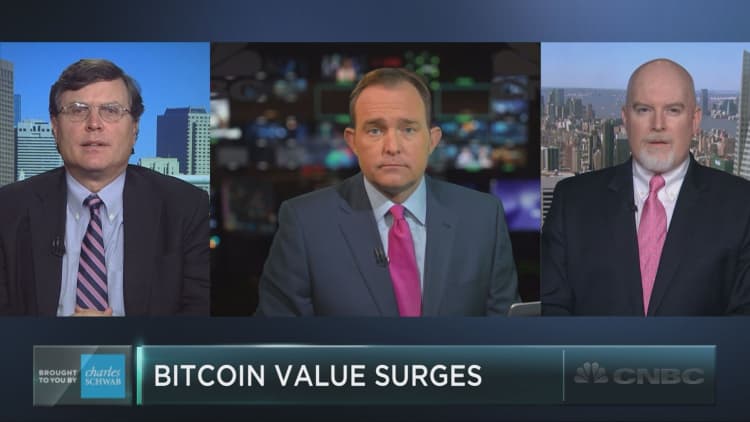
– the volatile digital currency that is used for a bevy of transaction, investment and value-storing purposes – is hovering around all-time highs, and its value has surged 175 percent in the past year.
But even though bitcoin is rising alongside gold, and it is often seen as an alternative "safe haven asset," this rally may actually be confirming the rally in stocks, rather than presenting a warning sign.
The currency has become more mainstream as additional companies accept bitcoin as a form of payment, Miller Tabak equity strategist Matt Maley said Wednesday on CNBC's "Trading Nation." According to this thinking, demand for bitcoin will rise as economic activity increases.
Bitcoin was created in 2009 in the midst of the financial crisis as a brand-new currency and payment network, and remains somewhat in the Wild West of currencies, without universal regulation, no central authority and tracked by ledger-like blockchain technology maintained by different firms.
Companies from Microsoft to Subway to popular blog platform WordPress now accept bitcoin as a form of payment.
More recently, Switzerland's financial regulatory authority granted a bitcoin firm approval to operate, Reuters reported, and in late 2016 JPMorgan was reported to have been working on its own type of blockchain technology to support bitcoin. Perhaps boosting bitcoin activity, too, is the prospect of bitcoin exchange-traded fund creation and bitcoin storage providers.
In the past, bitcoin rallies have frequently been seen as signs that investors are turning away from conventional assets, and hunting for places to stash their money. But as bitcoin has developed more "mainstream" business uses, Maley argued, it has become more correlated with equities.
A look at bitcoin's performance relative to the 's over the last five years does not show any particularly close mathematical relationship between the two.
Nobel laureate and economist Joseph Stiglitz said in January at the annual World Economic Forum meeting in Davos, Switzerland, that the United States moving toward digital currency would have meaningful benefits like curbing corruption and increasing transparency in global financial markets, two themes from this most recent meeting.
"There are important issues of privacy, cybersecurity, but it would certainly have big advantages," he said.
Bitcoin is not fiat currency, with no backing from a government that issues it, and the space is volatile given its lack of regulation. This month alone, bitcoin has risen 25 percent after dipping nearly 5 percent in January. It has climbed nearly 22,000 percent in five years while the dollar is up 28 percent in the same time period.
"The big fear around bitcoin is just one day when the governments come out and say, 'We're no longer going to allow this,' and we're going to shut it down. But in a world of Armageddon, where the world ends, currencies will go by the way of the countries; bitcoin, like gold, will still have value because of the blockchain-ing that goes on behind it," Dennis Davitt, portfolio manager at Harvest Volatility Management, said Wednesday on "Trading Nation."
The digital currency has a ways to go before becoming a full-on "mainstream" currency, but it's very much a real system of payment, Nicholas Colas, chief market strategist at Convergex, told CNBC on Wednesday. Given bitcoin's volatility, every time investors buy the currency at new highs, "you kind of want to hold your nose," Colas said, given its volatile nature and all the hills and valleys that come along with it.
Mt. Gox, a Tokyo-based digital currency exchange, went bankrupt in 2014 after substantial losses in the bitcoin space, sending the value of bitcoin tanking.
— CNBC's Alex Rosenberg contributed reporting.





